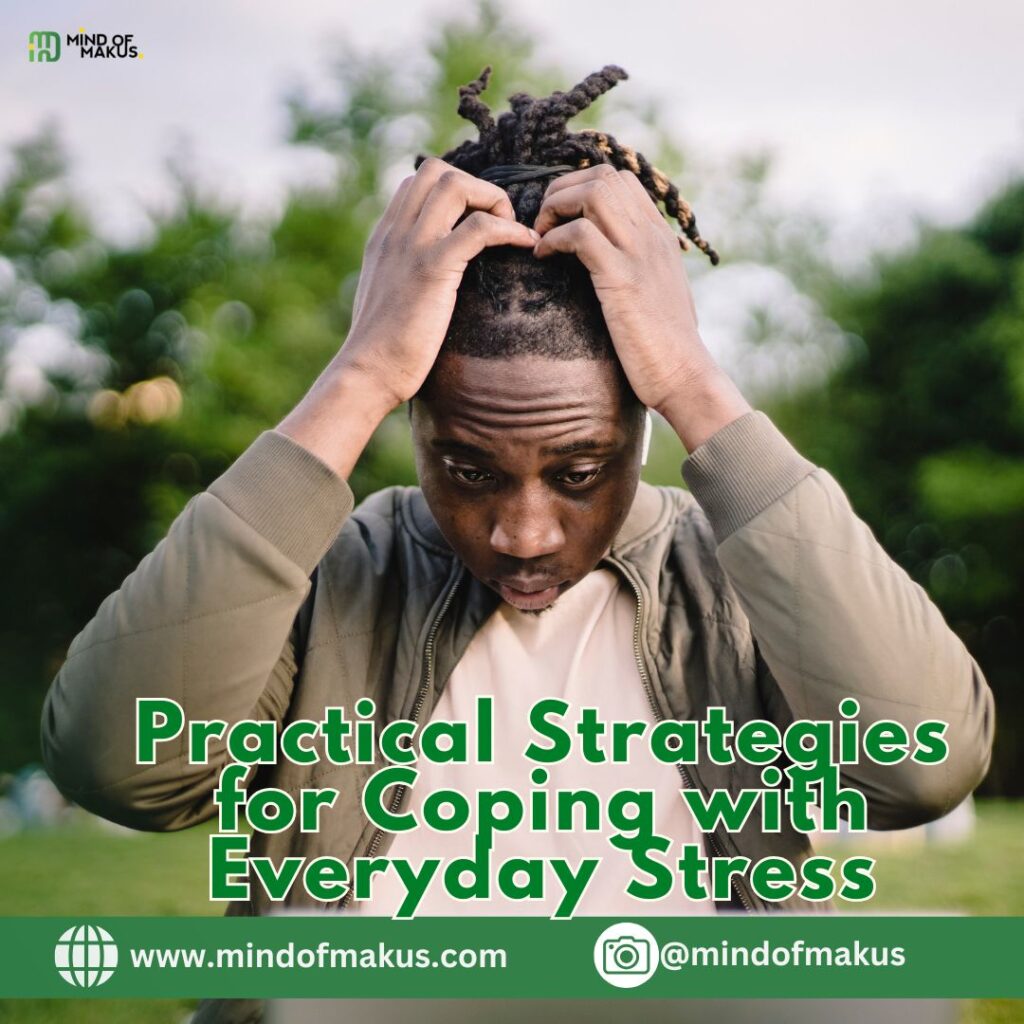Hello dear friends,
We are on that stress management roll and I am loving it, getting the privilege of reading my own advice and applying it all in real-time. I love it for me.
Some weeks ago, we looked at Daily Practices for Managing Stress: Simple Habits for a Calmer Life.
This week, we are looking at practical strategies for coping with stress.
Stress is a natural part of life, but when it becomes overwhelming, it can damage one’s mental and physical well-being. The good news is that there are practical, science-backed strategies for managing stress effectively.
I had a front-row seat to observing myself under stress since the year started. It’s been a thrill, I have felt like crying, I have just wanted to roll around and scream like a toddler. What did I do instead? I cancelled everything on my calendar and prayed a lot, then I apologized to everybody I had been spiky with, and just started over again at a slower pace. Sense wan finish me.
Pull up your chair and let’s gist, let me tell you what I learnt in the process:
Practical Strategies for Coping with Everyday Stress
1. Identify Your Stress Triggers
The first step to managing stress is recognizing what causes it. Understanding your personal triggers can help you address them more effectively.
🔍 Try This:
✔️ Keep a stress journal—write down when you feel stressed and what caused it.
✔️ Identify patterns in your thoughts and behaviours.
✔️ Develop a plan to minimize or cope with these triggers.
When you know your stressors, you can respond to them with greater control.
I made a lot of lists, you should too.
2. Practice Deep Breathing Techniques
One of the simplest and most effective ways to reduce stress is through deep breathing. It activates your body’s relaxation response, helping you feel calmer almost instantly.
🌬 Try This:
✔️ 4-7-8 Breathing: Inhale for 4 seconds, hold for 7 seconds, and exhale for 8 seconds.
✔️ Diaphragmatic Breathing: Breathe deeply from your belly rather than your chest.
✔️ Box Breathing: Inhale for 4 seconds, hold for 4, exhale for 4, hold for 4.
These techniques can be used anytime, anywhere, to regain a sense of calm, and it might not work for you too. Try it first.
3. Move Your Body
Physical activity is one of the best stress relievers. Exercise releases endorphins, the body’s natural mood boosters, helping to reduce stress and anxiety.
🏃 Try This:
✔️ Take a 15-minute walk outside.
✔️ Do simple stretches
✔️ Engage in a favourite sport or dance to music.
Even a little movement can make a big difference in your stress levels.
I joined a fitness program and got into an active community because I was in a slump and couldn’t help myself. Sometimes we just need to be humble and accept that the solution is in you but you need help. Don’t be proud. ok?
4. Set Healthy Boundaries
Many people experience stress because they take on too much—at work, in relationships, or in social obligations. Learning to say “no” is a powerful way to protect your mental space.
🚦 Try This:
✔️ Set clear limits on your workload.
✔️ Avoid overcommitting to activities that drain your energy.
✔️ Take breaks and disconnect from technology when needed.
Your well-being should always be a priority, boundaries help you to protect it. Now boundaries are not always about other people, it’s also about you.
Say no to yourself from time to time and prepare your internal system for success in the world. Calm it all down.
Subscribe to My Newsletter
5. Develop a Relaxation Routine
Incorporating relaxation into your daily schedule can help prevent stress from accumulating.
🛀 Try This:
✔️ Take a warm bath or shower.
✔️ Listen to calming music or nature sounds.
✔️ Engage in hobbies like reading, painting, or gardening.
Relaxation is not a luxury—it’s essential for maintaining balance in life.


6. Get Enough Sleep
Lack of sleep can intensify stress, making it harder to cope with daily challenges. Prioritizing rest is crucial for your overall well-being.
🛏 Try This:
✔️ Establish a consistent bedtime routine.
✔️ Avoid screens and caffeine before sleep.
✔️ Use deep breathing or meditation to wind down.
A well-rested mind is better equipped to handle stress. Invest in a sleep tracker, it will jumpstart your senses when you realize that you have been deceiving yourself about how much sleep you actually get.
Eat good food that nourishes you and energizes you.
7. Stay Connected with Supportive People
Social support is one of the best buffers against stress. Talking to someone who understands can provide emotional relief and a fresh perspective.
💬 Try This:
✔️ Reach out to a trusted friend or family member.
✔️ Join a support group or community.
✔️ Schedule regular social activities to stay connected.
You don’t have to navigate stress alone—lean on your support system.
8. Manage Your Time Wisely
Feeling overwhelmed often comes from poor time management. Organizing your tasks can help you feel more in control.
⏳ Try This:
✔️ Make a to-do list and prioritize tasks.
✔️ Break big tasks into smaller, manageable steps.
✔️ Use the Pomodoro Technique—work for 25 minutes, then take a 5-minute break.
A structured approach to time can reduce anxiety and boost productivity.


9. Practice Gratitude
Focusing on what’s going well in your life can shift your perspective and help you manage stress with a more positive mindset.
💖 Try This:
✔️ Write down three things you’re grateful for each day.
✔️ Reflect on past challenges you’ve overcome.
✔️ Express appreciation to others.
Gratitude has been proven to improve mental health and overall happiness.
Pray and thank God for what you have right now.
10. Seek Professional Help When Needed
If stress becomes overwhelming and starts affecting your daily life, seeking professional support is a wise decision. A therapist or counsellor can provide guidance and tools tailored to your specific needs.
There’s no shame in asking for help—it’s a step toward better mental health and self-care.
You can Support My Work
Final Thoughts: Stress is Manageable
Stress is a part of life, it reveals various opportunities for growth, but it doesn’t have to control you. By incorporating these practical strategies into your daily routine, you can build resilience, enhance your well-being, and face challenges with a calmer mind.
Until next time, stay authentic.
Stay resilient, and continue to honour your needs.
Live wholeheartedly,
Amaka
2 Cor 3:2(MSG)
You yourselves are all the endorsement we need. Your very lives are a letter that anyone can read by just looking at you. Christ himself wrote it—not with ink, but with God’s living Spirit; not chiseled into stone, but carved into human lives—and we publish it.



